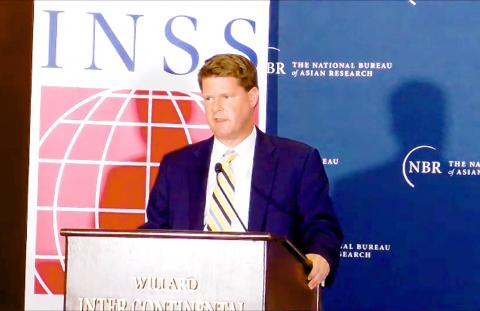In anticipation that China will try to meddle in next year’s presidential election, the US has started dialogue with Taiwan to help strengthen its ability to deal with the issue, a US official said on Wednesday.
“It’s a very important issue for us,” US Assistant Secretary of Defense for Asian and Pacific Security Affairs Randall Schriver said at the conclusion of a forum in Washington on Asian policies that touched on Taiwan’s presidential election.
“There’s no question in our minds that China will try to meddle, as it has done in every previous election,” Schriver said.

Photo: screen grab from the Internet
In 1996, it came in the form of missile exercises, he said, adding that in 2000, then-Chinese premier Zhu Rongji (朱鎔基) threatened Taiwanese voters.
Schriver was referring to an incident in 1996 in the buildup to Taiwan’s first direct presidential election in which China fired missiles into waters near Taiwan, apparently to dissuade people from voting for then-president Lee Teng-hui (李登輝).
Ahead of the 2000 presidential election, Beijing resorted to verbal threats, with Zhu warning voters not to vote for then-Democratic Progressive Party candidate Chen Shui-bian (陳水扁).
The biggest challenge facing Taiwan is the growing sophistication of the tactics used by China, Schriver said, adding that this time it is expected to use social media and cyberintrusions to interfere in Taiwan’s election.
Dialogue between the US and Taiwan has started, Schriver said, but declined to divulge details, adding only that the US would contribute to Taiwan’s abilities and expertise as the election approaches.
Also at the forum, American Institute in Taiwan Chairman James Moriarty said that the relationship between Taiwan and the US is governed not by policy, but by the US’ Taiwan Relations Act.
Taiwan is described as a beacon of democracy, which means that any Taiwanese younger than 35 has “democratic DNA,” he said.
“They expect to elect their leaders, they expect to be able to criticize their views, they expect to be able to throw out their own stuff,” Moriarty said.
After the forum, Moriarty told reporters that China should make sure its attempts to resolve cross-strait issues are acceptable to the people on both sides of the Taiwan Strait.
China’s “one country, two systems” formula is not helpful and not attractive to Taiwan, he added.

CHAOS: Iranians took to the streets playing celebratory music after reports of Khamenei’s death on Saturday, while mourners also gathered in Tehran yesterday Iranian Supreme Leader Ayatollah Ali Khamenei was killed in a major attack on Iran launched by Israel and the US, throwing the future of the Islamic republic into doubt and raising the risk of regional instability. Iranian state television and the state-run IRNA news agency announced the 86-year-old’s death early yesterday. US President Donald Trump said it gave Iranians their “greatest chance” to “take back” their country. The announcements came after a joint US and Israeli aerial bombardment that targeted Iranian military and governmental sites. Trump said the “heavy and pinpoint bombing” would continue through the week or as long

TRUST: The KMT said it respected the US’ timing and considerations, and hoped it would continue to honor its commitments to helping Taiwan bolster its defenses and deterrence US President Donald Trump is delaying a multibillion-dollar arms sale to Taiwan to ensure his visit to Beijing is successful, a New York Times report said. The weapons sales package has stalled in the US Department of State, the report said, citing US officials it did not identify. The White House has told agencies not to push forward ahead of Trump’s meeting with Chinese President Xi Jinping (習近平), it said. The two last month held a phone call to discuss trade and geopolitical flashpoints ahead of the summit. Xi raised the Taiwan issue and urged the US to handle arms sales to

State-run CPC Corp, Taiwan (CPC, 台灣中油) yesterday said that it had confirmed on Saturday night with its liquefied natural gas (LNG) and crude oil suppliers that shipments are proceeding as scheduled and that domestic supplies remain unaffected. The CPC yesterday announced the gasoline and diesel prices will rise by NT$0.2 and NT$0.4 per liter, respectively, starting Monday, citing Middle East tensions and blizzards in the eastern United States. CPC also iterated it has been reducing the proportion of crude oil imports from the Middle East and diversifying its supply sources in the past few years in response to geopolitical risks, expanding

Pro-democracy media tycoon Jimmy Lai’s (黎智英) fraud conviction and prison sentence were yesterday overturned by a Hong Kong court, in a surprise legal decision that comes soon after Lai was jailed for 20 years on a separate national security charge. Judges Jeremy Poon (潘兆初), Anthea Pang (彭寶琴) and Derek Pang (彭偉昌) said in the judgement that they allowed the appeal from Lai, and another defendant in the case, to proceed, as a lower court judge had “erred.” “The Court of Appeal gave them leave to appeal against their conviction, allowed their appeals, quashed the convictions and set aside the sentences,” the judges